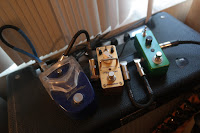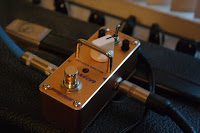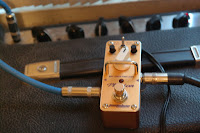The below post is a re-post from one of my old blogs, enjoy.

Fuzz pedals have been around for more than 40 years now. They were the first attempt to get the sound of a cranked amplifier without having to crank the amplifier. They were/are crude, and dare I say, sometimes not very pleasant sounding. Now if you were a guitar player in the late 60's, this was all you had at your disposal. Technology has advanced, amplifiers are capable of ridiculous gain at moderate volumes, and there are a million other distortion devices. So why does the fuzz pedal still prevail.
I came up in the era of the shred guitarist. Van Halen, Randy Rhoades, Ygwie Malmsteen. The requirements for this type of playing was a high gain yet articulate and clear sound to allow all the fast picked notes to be heard. There was no room for the woolly, unpredictable sound of a fuzz pedal so I just never gave them much thought. They were yesterdays technology.
Fast forward 20 years. Shred is less prevalent. Grunge hit us all in the face. And the wall of sound was being driven by fuzz pedals. All of a sudden, the Big Muff, Fuzz Face, Tone Bender etc... were all over the place. I couldn't believe it. Why were these guys using old technology? Of course grunge has since passed but the fuzz pedal is still here. Holy crap.
I finally decided to look into this a little. As I was learning to build my own stompboxes I decided that I needed to dive head first into a fuzz pedal. I build a fuzz face variant. After i got it working, I plugged in and let it rip. What an experience (no pun intended). I realized that while crude and somewhat odd sounding at times, the overtones and singing qualities of the pedal made me take notice.
There is a great range of sounds in a good fuzz pedal. Rolling back the volume yields a sweet overdrive with a hint of grit. Running it full out gets you a tone reminiscent of hell on a bad day. I finally got it.
If you have wondered about what all the fuss about fuzz is, go to your local music store and check one out. You may be surprised.
Scott
 Some of the earliest effects available to guitarists were tremolo and vibrato. These effects were usually built into the amplifier. Between the vibrato, tremolo, and reverb there was little else available to the electric guitarist.
Some of the earliest effects available to guitarists were tremolo and vibrato. These effects were usually built into the amplifier. Between the vibrato, tremolo, and reverb there was little else available to the electric guitarist.





















